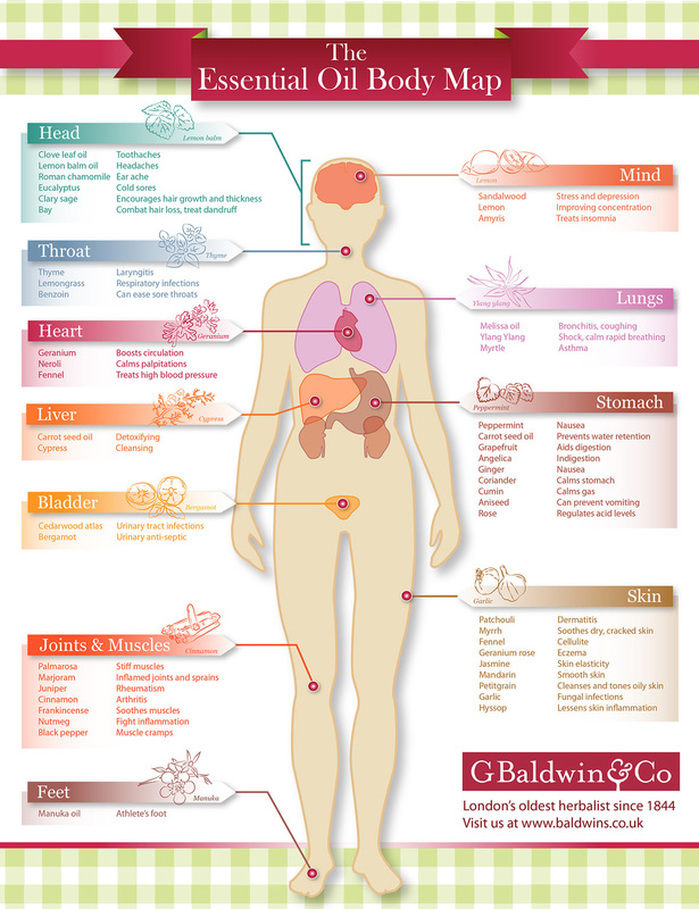Essential oils are becoming more and more common place, and for good reason! They are very versatile and can be used for therapeutic, cosmetic, and home purposes.
How are they made?
Essential oils are highly concentrated plant components. It can take a large amount of plant to produce a small bottle of essential oil. Because of this some oils can be quite pricey.
What can I use essential oils for?
There are endless uses for essential oils; cleaning, relaxing body & mind, removing body odor, supporting the nervous system, aiding digestion, supporting the immune system…just to name a few! See the infographic below to see how and where to use specific essential oils.
When using essential oils topically, they should be diluted in a carrier, as the pure oil can be irritating to the skin. Dilute the oil in coconut, almond, or jojoba oil then apply.
Some of my favorite uses of essential oils:
In a room diffuser: Lavender, Cinnamon, lemon, or Orange oil are few of my favorites to add to an essential oil diffuser.
Cleaning: I make a natural cleaner with white vinegar, water, and 5-10 drops of essential oil in a spray bottle. Tea tree, lemon, or peppermint oil are great options as in addition to scent they also have anti-microbial properties.
Laundry: add a few drops of lavender oil to the wash or in the dryer to a wool dryer ball to add a fresh calming scent without all the chemicals of dryer sheets.
Topical: Tea-tree oil is a great spot treatment for acne. Peppermint can be great for headaches and an energy boost – apply to temples or nostrils.
Who shouldn’t, or should make use of oils?
Essential oils possess chemical properties, which can enter the bloodstream and affect the entire body. Essential oils should be used with caution as they can increase sensitivity to the sun.
Doctors should always be informed before patients make use of essential oils for complementing a medical condition. Rosemary, hyssop, thyme and sage should be avoided by individuals having high blood pressure, while angelica oil should be avoided by diabetics. Nursing or pregnant women should avoid several oils which stimulate the uterus which includes basil, star anise, and juniper to mention a few.
Tips for Purchasing Oils
Essential oils coming from a general store could be of doubtful quality; look for oils in a specialized store, with staff that have training in aromatherapy.
Quality essential oils, which are heat and light sensitive, should be in a brown or blue light shielding glass.
Bottle labels should give both the botanical and common essential oil name.
Stay away from concentrated oils having rubber eyedroppers for the reason that the oils and the rubber react, resulting in it to break up and contamination of the oil.
How are they made?
Essential oils are highly concentrated plant components. It can take a large amount of plant to produce a small bottle of essential oil. Because of this some oils can be quite pricey.
What can I use essential oils for?
There are endless uses for essential oils; cleaning, relaxing body & mind, removing body odor, supporting the nervous system, aiding digestion, supporting the immune system…just to name a few! See the infographic below to see how and where to use specific essential oils.
When using essential oils topically, they should be diluted in a carrier, as the pure oil can be irritating to the skin. Dilute the oil in coconut, almond, or jojoba oil then apply.
Some of my favorite uses of essential oils:
In a room diffuser: Lavender, Cinnamon, lemon, or Orange oil are few of my favorites to add to an essential oil diffuser.
Cleaning: I make a natural cleaner with white vinegar, water, and 5-10 drops of essential oil in a spray bottle. Tea tree, lemon, or peppermint oil are great options as in addition to scent they also have anti-microbial properties.
Laundry: add a few drops of lavender oil to the wash or in the dryer to a wool dryer ball to add a fresh calming scent without all the chemicals of dryer sheets.
Topical: Tea-tree oil is a great spot treatment for acne. Peppermint can be great for headaches and an energy boost – apply to temples or nostrils.
Who shouldn’t, or should make use of oils?
Essential oils possess chemical properties, which can enter the bloodstream and affect the entire body. Essential oils should be used with caution as they can increase sensitivity to the sun.
Doctors should always be informed before patients make use of essential oils for complementing a medical condition. Rosemary, hyssop, thyme and sage should be avoided by individuals having high blood pressure, while angelica oil should be avoided by diabetics. Nursing or pregnant women should avoid several oils which stimulate the uterus which includes basil, star anise, and juniper to mention a few.
Tips for Purchasing Oils
Essential oils coming from a general store could be of doubtful quality; look for oils in a specialized store, with staff that have training in aromatherapy.
Quality essential oils, which are heat and light sensitive, should be in a brown or blue light shielding glass.
Bottle labels should give both the botanical and common essential oil name.
Stay away from concentrated oils having rubber eyedroppers for the reason that the oils and the rubber react, resulting in it to break up and contamination of the oil.

 RSS Feed
RSS Feed